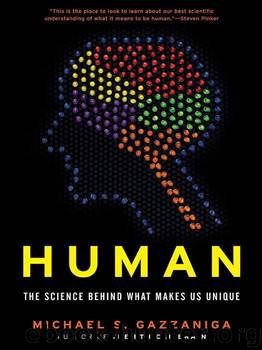Human by Michael Gazzaniga

Author:Michael Gazzaniga
Language: eng
Format: mobi
Publisher: HarperCollins e-books
Published: 2008-06-24T04:00:00+00:00
Does Music Affect Our Thinking Abilities?
Spatial abilities are used to create, think of, remember, and change visual images in one’s mind. For instance, looking at a two-dimensional map and being able to visualize its information in three dimensions to find one’s way around in a city uses spatial ability. A few years ago, there was a suggestion that listening to certain classical music would increase your spatial abilities.93 It became dubbed the Mozart effect. However, it proved difficult to confirm, and later studies revealed that it wasn’t listening to classical music or Mozart per se that made you smarter, but rather listening to music you prefer puts you in a better mood. When you are in a good mood, you are aroused, and this can lead to enhanced performance on a variety of tests of cognitive ability. Arousal stimuli aren’t limited to music. One can be aroused by other preferred stimuli, such as a licking a glob of Nutella off your finger, or drinking a cup of coffee.94
Moreover, listening to music and actually taking music lessons are two different things in terms of their effect on the brain. Glenn Schellenberg, at the University of Toronto, has found in a randomly assigned group of six-year-old children who received keyboard lessons, voice lessons, drama lessons, or no lessons that music lessons in childhood are associated with small but long-lasting increases in IQ. (He incidentally found that drama lessons enhance social behavior but not IQ.) This increase was not affected by family income or parents’ education, nor was it seen with other types of extracurricular studies. Learning music made you a little bit smarter. You can safely bet that these findings have sparked a great deal of interest. Proof of training in one field that generalizes to others has been hard to find.
In a detailed review of transfer effects, the ability to transfer knowledge gained in one context to another very similar context (near transfer) or dissimilar context (far transfer), Steve Ceci and colleagues95 found little evidence in a century’s worth of previous studies for far transfer. Although there is little evidence for it, there is widespread belief that far transfer occurs, and this belief is central to Western concepts of education. Schellenberg points out that the goals of formal education are not just to build skills in reading, writing, and arithmetic but to develop the capacity for reasoning and critical thinking. His data that reveal music lessons increase IQ are a rare example of far transfer and might actually contribute to this process.96 Should we be putting band and music lessons back in school programs instead of trimming them from the budgets? Do we know what music training does for the brain? We know a little but not exactly why it may increase IQ.
We know that musicians are using many skills at one time. They are seeing notes that are written and translating them to a special motor activity that has a time line. This involves both hands and in some cases the legs and feet, the mouth, and the lungs.
Download
This site does not store any files on its server. We only index and link to content provided by other sites. Please contact the content providers to delete copyright contents if any and email us, we'll remove relevant links or contents immediately.
Sapiens: A Brief History of Humankind by Yuval Noah Harari(14361)
Sapiens by Yuval Noah Harari(5363)
Pale Blue Dot by Carl Sagan(4996)
Homo Deus: A Brief History of Tomorrow by Yuval Noah Harari(4904)
Livewired by David Eagleman(3763)
Origin Story: A Big History of Everything by David Christian(3680)
Brief Answers to the Big Questions by Stephen Hawking(3426)
Inferior by Angela Saini(3311)
Origin Story by David Christian(3194)
Signature in the Cell: DNA and the Evidence for Intelligent Design by Stephen C. Meyer(3125)
The Gene: An Intimate History by Siddhartha Mukherjee(3091)
The Evolution of Beauty by Richard O. Prum(2992)
Aliens by Jim Al-Khalili(2827)
How The Mind Works by Steven Pinker(2811)
A Short History of Nearly Everything by Bryson Bill(2687)
Sex at Dawn: The Prehistoric Origins of Modern Sexuality by Ryan Christopher(2513)
From Bacteria to Bach and Back by Daniel C. Dennett(2481)
Endless Forms Most Beautiful by Sean B. Carroll(2473)
Who We Are and How We Got Here by David Reich(2431)
